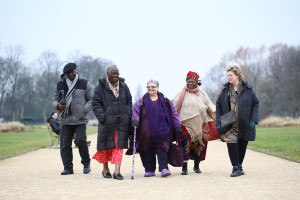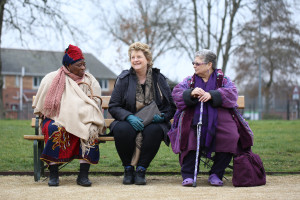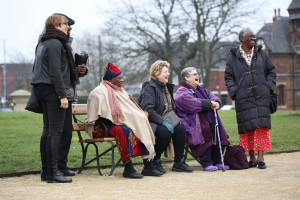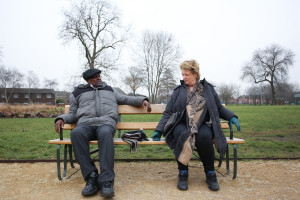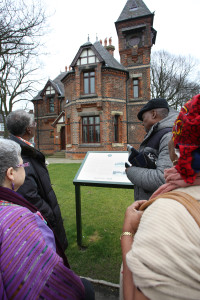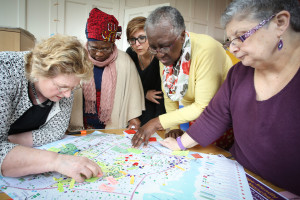Age-friendly Manchester project wins national award
A project which trained older people to be researchers into the future of their city has won a major national award for its ground-breaking work, on a night when two other Manchester projects were also shortlisted.
The Researching Age-Friendly Communities initiative was developed in response to the fact that in 15 years, a quarter of the world population living in cities will be over-60, as more and more people choose to stay or grow old in urban environments.
Ageing in cities has major implications for services such as transport, housing and the prevention of social isolation. The Manchester researchers – led by Dr Tine Buffel (supported with funding from the European Union) – trained people in their 50s through to their 80s to become co-researchers, who then conducted interviews in Manchester neighbourhoods amongst older people likely to be experiencing problems associated with social isolation, poverty and poor health.
Throughout the project, a range of public engagement activities were held, including meetings, winter warm events, coffee mornings and neighbourhood social gatherings.
The project was presented at these events by the co-researchers to increase awareness and to strengthen links with community organisations.The project led to direct policy outcomes for Manchester City Council, with older people actively influencing solutions to many of the challenges experienced by their fellow older residents in the city.
The project scooped an Engage Award on 29 November, recognising that the project among the best in the sector for involving the public in university work. It was led by the University Manchester Institute for Collaborative Research on Ageing (MICRA), working with Manchester City Council, Whalley Range Community Forum, Chorlton Good Neighbours Neighbourhood Care Group, Age Friendly Whalley Range and Chorlton and others.
“I am delighted that Manchester age-friendly partnership working with older co-researchers and community organisations has been recognised in this way” said Chris Phillipson, Professor of Sociology and Social Gerontology at The University of Manchester and one of the researchers on the project.
“Everyone has gained from having older people as co-researchers working alongside to improve the age-friendliness of their neighbourhood, and to improve the quality of life in low-income areas.”
“We hope this will inspire more researchers to utilise the vast skills, experience and resources of older people in all stages of research, from design and implementation to analysis and dissemination of findings.”
Older people join academics to research UK’s first ‘age-friendly’ city
New film showcases the work of Manchester sociologists and their co-researchers, aged between 58 and 74-years-old.
In 15 years, a quarter of the world population living in cities will be over-60, as more and more people choose to grow old there.
In a unique project where older people were trained as co-researchers to look into the age-friendliness of cities, sociologists from The University of Manchester have found social inclusion to be the secret to ageing well – while age-friendly transport and housing make them feel more a part of the urban neighbourhoods they live in.
The Manchester Institute for Collaborative Research on Ageing (MICRA) at The University of Manchester, has created a short film, to be shown in public for the first time this week, which shows how the research can be replicated to make a difference to the lives of older generations in cities around the world.
The project was led by Dr Tine Buffel who features in the film alongside some of her 18 older co-investigators, who were aged between 58 and 74-years-old. The 15-minute documentary (which also has a 1.24min trailer) provides a snapshot of the lives of older people living in Whalley Range and Chorlton, in Manchester, which became the first UK city to be recognised as age-friendly by the World Health Organisation in 2010.
Dr Buffel said: “Older people have the right to feel like their city belongs to them because they make such a large contribution to their city throughout their lives.”
The co-researchers worked with The University of Manchester to examine experiences of ageing in three neighbourhoods of the city. They played a key role in identifying questions, recruiting participants and analysing data, interviewing 68 older people who were experiencing varying degrees of poverty and social isolation. They received a training certificate from MICRA at the end of the project.
Dr Buffel said: “Our older co-researchers were an essential part of the study because they were able to involve people who were particularly isolated in the community. Without this, the views of more socially-excluded people would not have been heard.”
“The findings of this project have influenced the city community development work and shaped the city plans for developing age-friendly neighbourhoods. The project can now serve as a pilot scheme which can be adopted by other places with actions and strategies that have had a real impact on the age-friendliness of city neighbourhoods.”
Councillor Sue Cooley, Manchester City Council’s lead for Age-Friendly Manchester, said: “By involving older people from the outset, this new research in Manchester shows some of the small steps that can be made which make a huge difference to the lives of older people not only in our city but around the world.”
Researching Age-Friendly Communities
Stories from older people as co-investigators
- “The case for involving older residents as co-researchers in exploring the age-friendliness of their neighbourhood is that it represents a viable method to engage older residents and mobilise their expertise, skills and knowledge and to stimulate co-production in developing age-friendly initiatives. In addition, it provides benefits to the older co-researchers, community stakeholders and policy-makers involved, because it provides a forum for rich and meaningful social engagement and mutual learning and exchange (Buffel, 2015b). However, there remains a need for experimentation to test and learn from participatory and collaborative approaches involving older people in the co-production of urban space. “
Age-friendly presentation at the UN summit in New York
Please see the following appended message from Tine Buffel:
See below a short mention about my presentation at the UN headquarters (in New York )
I mentioned the work with co-researchers at the UN in the work group on aging as a good practice showing how you can give older people a voice in the issues that are important to them in their communities:
Manchester presents to the United Nations
The Manchester Institute for Collaborative Research on Ageing (MICRA), based at The University of Manchester, is to present to the United Nations this week. At a session on the human rights of older people, Dr Tine Buffel will outline the institute’s ground-breaking project, whereby older residents were trained as co-researchers to explore the ‘age-friendliness’ of cities.
Tine presented the project in New York this week at the United Nations three-day summit on protecting the human rights and dignity of older people!
Please see the press release below
http://www.socialsciences.manchester.ac.uk/research/research-impact/age-friendly-neighbourhoods/
Manchester presents to the United Nations
14 Jul 2015
The Manchester Institute for Collaborative Research on Ageing (MICRA) will inform a session on the human rights of older people at the UN in New York
Dr Tine Buffel explores the ‘age-friendliness’ of cities with co-researchers
Manchester will present to the United Nations this week on its ground-breaking work to improve the lives of older people.
Dr Tine Buffel, of The University of Manchester, will join a panel at the UN in New York to present research around ageing in cities.
The University Manchester Institute for Collaborative Research on Ageing (MICRA) has spearheaded a unique project in which older residents, aged between 58 and 74-years-old, were trained as co-researchers to work alongside sociologists exploring the age-friendliness of cities.
Today Dr Buffel will present their work, delivered with partners across the city, as part of a three-day UN summit on protecting the human rights and dignity of older people.
Dr Buffel, a research fellow at MICRA at The University of Manchester, said: The age-friendly approach is increasingly recognised as a model which promotes the right to a good old age. This is a fantastic opportunity to present Manchester innovative research and practice across the city council, the University and local communities to a global audience. Our experience is that training older people as co-researchers is effective in gaining a deeper understanding of the issues that older people themselves view as important. We want older people to feel that the city belongs to them as much as anyone else – and we believe the age-friendly approach is effective in doing this and can be replicated across neighbourhoods.
Manchester became the first UK city to be recognised as age-friendly by the World Health Organisation in 2010. University of Manchester researchers predict that in 15 years time, a quarter of the world population living in cities will be over-60.
Link to the summit Twitter feed videos (including our film)
https://twitter.com/search?q=%23OEWG6&src=typd&vertical=default&f=videos
Twitter hashtag #OEWG6
About, Awards, Links – and Photos (by Chris Foster Photography http://www.chrisfosterphotography.com/ )
Dr Tine Buffel wins a Social Responsibility Making a Difference Award
(22 May 2015)
Dr Tine Buffel, School of Social Sciences and MICRA, was the winner of the University of Manchester “Outstanding Local Community Collaboration†award for her project, Manchester Ageing Study.
In this project, Tine works together with older residents, community organisations and Manchester City Council to produce research and identify actions and strategies to improve the age-friendliness of local neighbourhoods. An important feature is the active involvement of older people, who were trained as co-researchers, in all stages of the project.
The project focusses upon both researching and working with older people living in areas of high deprivation with a view to improving their experience of living in the city. It builds on policy priorities in the context of the Council being an active member of the World Health Organization (WHO) Global Network of ‘Age-Friendly Cities’ (2007:12), these defined as encouraging active ageing in order to enhance quality of life as people age. The project builds on a key principle developed by the WHO: the idea of prioritizing the role of older people in developing research and action plans to improve the age-friendliness of their neighbourhood.
Through collaborative work with community organizations across three neighbourhoods in South Manchester, 18 older residents from different ethnic groups were trained to become co-researchers in the project. They have played a key role in all stages of the research, including the planning, design and implementation phases. Training sessions focused on designing interview questions, data collection and sharing/translating findings. The co-researchers conducted 68 interviews with difficult-to-reach older people about their needs to age well in the community. They also worked together with local community organisations to develop actions and strategies for social change on the basis of the research findings. In addition, 14 focus groups were held with community stakeholders to collaboratively identify opportunities for improving the age-friendliness of the different neighbourhoods.
In the next couple of Weeks we will see the release of a production film featuring the co-researchers that highlights the impact of research on ageing, urban environments and inequalities. Also, as the project nears completion Tine, with the help of her co-researchers, will release a booklet focussing on the process of involving older people in the research process.
For more information about the awards please follow the link below:
Gallery…
Photos by Chris Foster Photography: http://www.chrisfosterphotography.com/


